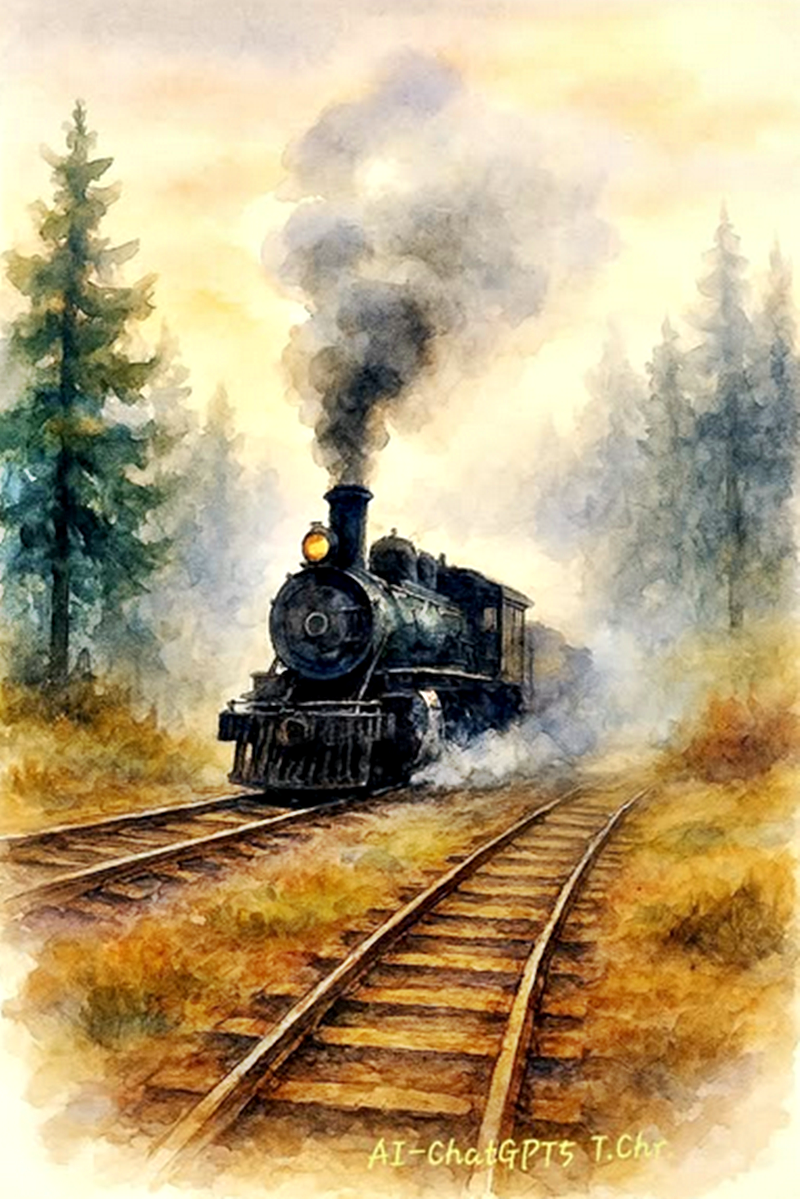TRAIN DREAMS

BY AI-ChatGPT5-T.Chr.-Human Synthesis-04 October 2025
A frontier story of love, loss, and the quiet mercy of time.
The Sound of Iron and Rain
Mist coiled like smoke across the valley, wrapping the child in its cold, uncertain arms. He stood barefoot on the wet earth, the smell of sap and iron heavy in the air. Men shouted among the trees, axes cracked, and sparks leapt from the rails where steel met stone. The noise of progress had come to the wilderness, and the wilderness did not forgive easily. Robert Grainier’s father was among the workers, his broad back bending over a sledgehammer.
His mother watched from the edge of the camp, coughing softly into a rag. She had the look of someone waiting for a storm she already knew she could not survive. At night, when the fires burned low, Robert listened to her hum songs of the old country. Her voice was thin, but warm. Then one morning, she was gone, her bed empty but for a folded shawl. His father buried her beneath a cedar tree without a word, and two months later, an accident on the line took him too.
The boy was left with the sound of rain on tin roofs and the endless echo of hammer on steel. “He was born where iron met earth — and the earth never forgave.”That was what the old cook said the day they took Robert on as a camp boy. Nobody remembered his birthday. Nobody asked where he came from. In the railroad camps, every man’s story began and ended with the tracks.
The Railroad Men
By the time Robert turned twenty, he was a man of iron and silence. He could swing a maul for twelve hours without stopping, carry ties through mud and snow, and sleep beside a frozen river without complaint. The work crews were rough, half-wild men — Swedes, Irish, Chinese, ex-convicts, and drifters from every place the world forgot. They fought, drank, and died in equal measure. In the dim firelight, they told stories of mountains that breathed, of wolves that spoke in human tongues, and of the “iron snake” that would one day coil around the world.
One night, a Chinese laborer named Lian gave Robert a carved token for luck — a tiger biting its own tail. “Keep safe,” he said in broken English. “The forest does not forget. Two days later, a blast went off too early, and Lian was gone. Robert found his hat stuck in a pine like a prayer. That night, the wind rose and carried a sound that could have been weeping — or laughter. Robert poured out his whiskey, threw the token into the fire, and said nothing. From then on, he worked as though the forest watched him.
The Crossing
The world softened the year he met Gladys. She came to the mission outpost after a flood had taken her parents and brothers down the Salmon River. She wore black still, her hair tied in a single braid, her voice gentle but firm. Robert first saw her under a curtain of rain, carrying medicine to a sick child. Her sleeves were soaked, her shoes ruined, but her eyes — gray and unyielding — met his without flinching. Over the months, she nursed the camp’s wounded, taught children to read, and somehow found time to laugh again. Robert brought her berries, mended her fence, and once fixed the broken roof of her cabin.
They married in spring beneath the cottonwoods, with only the preacher and a pair of river otters as witnesses. Soon after, their daughter Millie was born — bright-eyed, all curls and curiosity. The cabin near the Clearwater River filled with the smell of pine smoke and wildflowers. Gladys would sing as she hung laundry in the wind. Robert built a cradle, a rocking chair, and a small garden. For a brief, impossible time, peace settled over them like mist. “He had thought the world could only take from him. For a time, it gave.”
Fire Season
That peace ended the year the summer turned to dust. The river ran low, the pines crackled with thirst, and the air hung thick with waiting. It began with a spark — a loose coal from a passing train. By evening, the hills glowed orange. By midnight, the world was a furnace. Robert ran for home, the smoke clawing at his throat. The air itself burned. Trees fell like torches, and embers drifted through the darkness like falling stars. He reached the clearing too late.
The fire had taken everything — the cabin, the cradle, even the garden fence. He fell to his knees and dug through ash until dawn. When the wind shifted, he found a child’s carved horse, its head blackened, one leg gone. He held it until the sky grew pale. The forest was silent. Then snow began to fall — too early for the season, too cold for mercy. He did not scream. He did not cry. He simply stayed until the world turned white.
The Years Between
After that, Robert drifted. He worked wherever the land would have him — in logging camps, river barges, and mining outposts. His hands grew hard, his words few. He spoke to the river sometimes, or to the wind. He believed the forest listened. In one camp, he met a traveling preacher who said, “God’s mercy is slow, but it comes.”Robert replied quietly, “Then it must be walking.”He dreamed often of Gladys and Millie. In the dreams, they stood at the edge of a clearing, just beyond reach. Each time, they seemed less like memories and more like something waiting for him — something patient and real. When he woke, he left food and small wooden toys in the woods. Foolish, yes, but it kept him human.
The Vision at Elk Valley
Winter came hard the year the storm buried Elk Valley. The snow rose higher than the cabins, and silence ruled the mountains. Robert found a man trapped under a fallen tree, his breath shallow, his eyes glassy. The stranger gripped Robert’s sleeve and whispered, “I saw the tracks that lead to heaven. They shine in the dark. Follow them and you’ll find your dead.” By morning, the man was gone. Robert buried him beneath the snow and followed the old, overgrown spur line that wound through the forest. At its end, he found a clearing, empty except for the sound of running water. Then — faintly, impossibly — he heard a child’s laughter. He left a loaf of bread and a carved horse on a stump, bowed his head, and whispered, “I remember.”That night, a wolf came and lay beside his fire. When Robert reached to touch it, it vanished into smoke.
The Modern World
The years unspooled quietly. Trains turned electric, cars filled the valleys, airplanes cut the clouds. The young spoke faster, worked quicker, and forgot sooner. Robert lived alone in a small shack by the tracks he had once helped lay. The iron had rusted, the telegraph poles leaned like tired sentinels. One afternoon, a young engineer stopped his motorcar near the bend. “Need a ride, old timer?” he asked. Robert smiled, his eyes still blue beneath the years.
He, ”I’ve been traveling my whole life,” he said. “I’m where I’m meant to be.”When the car was gone, he stood listening. The wind through the trees sounded almost like distant wheels on rails. A week later, he saw a photograph in a store window — a picture of the old railroad days. In the corner stood a young man with a hammer on his shoulder, eyes bright with purpose. Robert stared for a long time before realizing it was himself.
The Final Winter
The avalanche came with no warning — a roar that tore through the valley like thunder. The camp vanished beneath snow and silence. Men called for help, prayed, wept. Robert dug until his hands bled, saving two before collapsing. When rescue arrived, he refused to go. “I’m done being saved,” he said softly. He walked toward the valley where his home had once stood. The snow was deep, the sky a pale, merciful gray. At the river’s bend, he found the ruins of his cabin — a single beam still standing, leaning like a cross against the wind.
He sat beneath it, breath clouding in the air. The forest hummed faintly, as though breathing with him. Then he saw them — Gladys and Millie by the water’s edge, their faces calm, their hands outstretched. He rose, smiled, and took a step forward. The snow gleamed like silver beneath his feet. “He had dreamed of trains, of love, of loss — and at the end, the rails all led home.”The forest whispered, and somewhere far away, a train whistle sounded once — long, low, and beautiful.
The mist folded over him, and Robert Grainier was gone.
